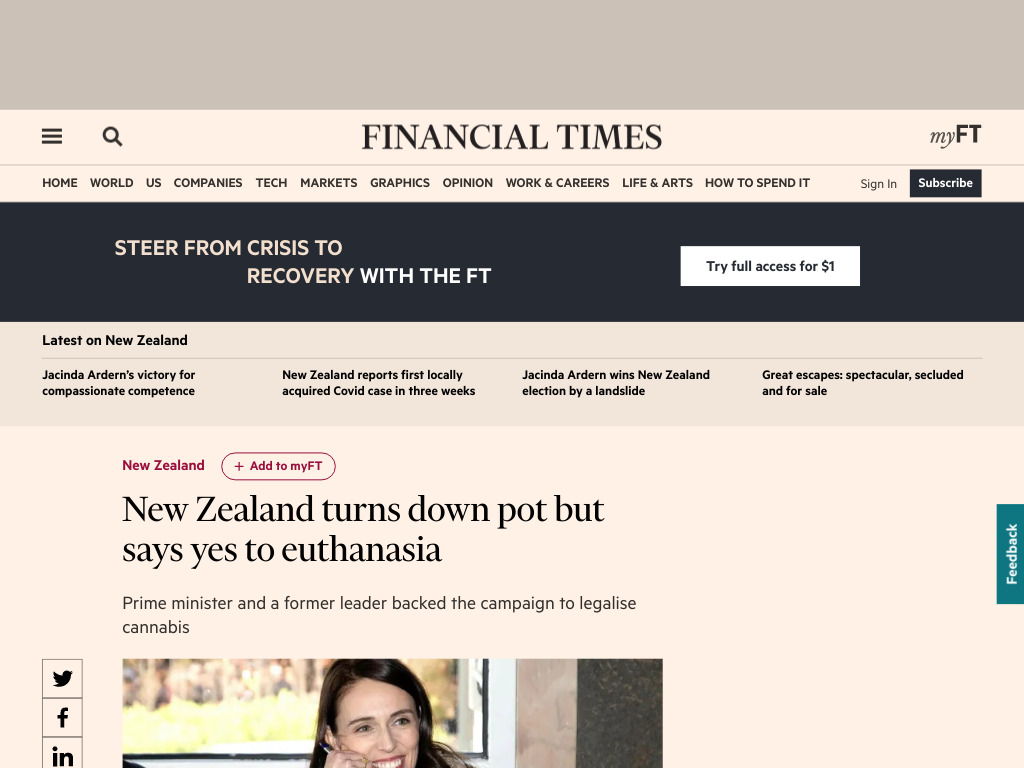New Zealanders may have elected their most progressive government since the 1970s and voted to introduce euthanasia but preliminary referendum results show the Pacific nation has drawn the line at legalising pot.
To the disappointment of campaigners and the marijuana industry, the proposal to legalise and regulate cannabis possession and distribution is on course to be defeated by a narrow margin of 53 per cent against and 46 per cent in favour.
A further 500,000 special votes — postal ballots and others not cast at a polling stations — are due to be counted next week but polling experts said it was very unlikely these could change the result.
Voters overwhelmingly backed the legalisation of euthanasia by a wide margin of 65.2 per cent to 33.8 per cent. The move will give people aged over 18 with a terminal illness the right to apply to end their life under certain criteria.
Legislation has already passed New Zealand’s parliament on this and the scheme, which was contingent on a yes vote, will enter into force in just over a year.
Andrew Little, New Zealand’s justice minister, said on Friday that the euthanasia vote was virtually unassailable given the wide margin in favour of legalisation.
“On the cannabis question the specials would have to break 70 per cent 'yes' in order to overturn that result today, so I think we can be pretty sure that the electorate does not support the legalisation of cannabis,” he said.
The Labour party, which won a landslide victory in the October 17 election, said it would follow the will of the people on the referendum results. Jacinda Ardern, New Zealand’s prime minister, who admitted during the referendum campaign that she smoked marijuana during her youth, confirmed on Friday she had voted in favour of legalising euthanasia and cannabis.
Pro-cannabis campaigners, including Helen Clark, the former prime minister, argued prohibition-based policy approaches had not eradicated cannabis consumption or supply in New Zealand or elsewhere. Many had hoped New Zealand would join Canada, Uruguay and several US states in legalising the possession, use and supply of cannabis.
No campaigners had argued legalisation would enable “big marijuana” to establish a cannabis market that would exploit and harm young people. This was disputed by pro-cannabis campaigners, who said tight regulation would prevent foreign companies from flooding the market.
The legal market for cannabis was worth nearly $11bn globally in 2018 and could reach $50bn by 2029, as more nations legalise the drug for medicinal and recreational use, according to Jefferies equity research.
Bob McCoskrie, one of the leaders of the “Say Nope To Dope” campaign, said he had been concerned the swing to the left in the election could have effected the referendum campaign.
“The surprise of the vote is that it has pushed against the prevailing wind, which has been to liberalise laws around social issues: same-sex marriage, anti-smacking law, decriminalising prostitution, decriminalising abortion and just today legalising euthanasia. But then, lo and behold, suddenly we’ve said no to legalising cannabis for recreational use.”
Abe Gray, a veteran campaigner dubbed the “Gandalf of Weed” by local media, said he was disappointed by the result but also invigorated because support for legalising cannabis had more than doubled in recent years.
“Another vote would be five to 10 years away at least. What is more likely is a gradual step by step easing towards a more formalised decriminalisation,” Mr Gray said.



maybe they prohibited chewing with your mouth open